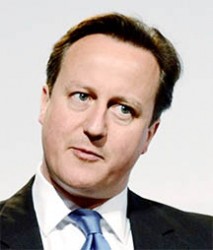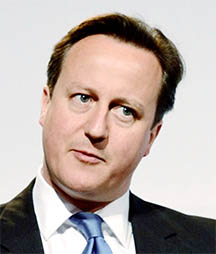LONDON, (Reuters) – British Prime Minister David Cameron swept to a stunning election victory yesterday, confounding forecasts that the vote would be the closest in decades and winning a clear majority that left his Labour opponents in tatters.
The sterling currency, bonds and shares surged on a result that reversed near-universal expectations of an inconclusive “hung parliament”, in which Cameron would have had to jockey for power with Labour rival Ed Miliband.

Instead, Cameron met Queen Elizabeth at Buckingham Palace to accept a mandate to form the first majority Conservative government since John Major’s surprise victory in 1992.
Despite the unexpectedly decisive outcome, longer-term uncertainty looms over whether Britain will stay in the European Union – and even hold together as a country. Secessionists swept the board in Scotland, and Cameron repeated a promise to hold a referendum on EU membership. The scale of his triumph surpassed his party’s most optimistic projections.
“This is the sweetest victory of all,” Cameron, 48, told enthusiastic supporters at party headquarters.
Smiling beside his wife Samantha, he returned to the prime minister’s office in Downing Street after meeting the queen. Staff lined up to applaud when he entered the residence. Cameron’s pitch to voters was that he had rescued Britain from economic crisis to deliver the fastest growth among major economies. He had warned that Labour’s Miliband would cripple the United Kingdom by giving Scottish nationalists the keys to England’s treasure. In early appointments to his cabinet, he retained George Osborne as finance minister, sticking with the man credited with overseeing recovery from the economic crash, and reappointed his foreign, interior and defence ministers.
Miliband, a self-confessed socialist “geek”, had argued that the recovery was benefiting the rich and most people were still worse off. But he failed to connect with working class voters or convince the public he could be trusted with the world’s fifth largest economy. He phoned Cameron to concede and then resigned as party leader.
With all results declared in the 650-seat house, the Conservatives held 331 and Labour 232. The centre-left Liberal Democrats, who supported Cameron in government since 2010, were all but wiped out, reduced to eight seats from 57.
Scottish nationalists won 56 of the 59 Scottish seats, up from just six five years ago.
The anti-EU, populist UK Independence Party (UKIP) surged into third place in the overall vote tally, but disappointed its followers by managing to place first in only one district to win just a single seat. Like Labour’s Miliband, Lib-Dem leader Nick Clegg and UKIP leader Nigel Farage resigned as party leaders.
Sterling gained more than 2 cents against the dollar
to rise above $1.55 for the first time since late February, though it later eased back to around 1.5450.
The FTSE 100 stock index closed 2.3 percent stronger, approaching a record high set last month. The price of British government bonds also rose.
“DISUNITED KINGDOM”?
Cameron’s victory means Britain will face a vote which he has promised by the end of 2017 on continued EU membership.
Many Britons, including lawmakers in his own party, are frustrated by EU bureaucracy, high levels of immigration from the bloc and the precedence of laws made in Brussels over those passed in the Westminster parliament.
Cameron says he wants to stay in Europe, but only if he can renegotiate Britain’s relationship with Brussels to strike a better deal.
European leaders lost no time in offering him talks on reform, with French President Francois Hollande inviting him to Paris. Jean-Claude Juncker, president of the EU Commission, told Cameron: “I stand ready to work with you to strike a fair deal for the United Kingdom in the EU.” But the EU executive again stressed there could be no renegotiation of the bloc’s basic treaties.
In Scotland, the extraordinary scale of the nationalist landslide victory reopened the question of the future of the United Kingdom less than a year after Scots voted in a referendum to remain inside it.

